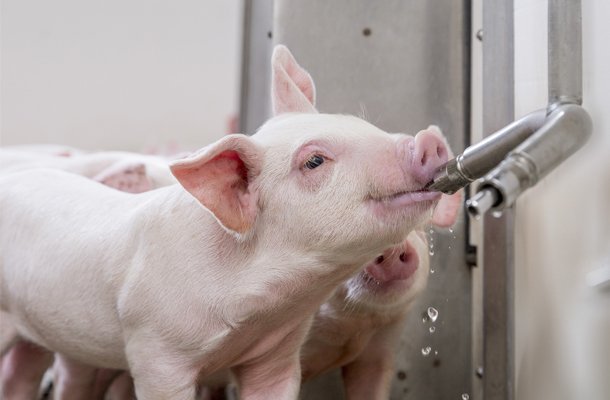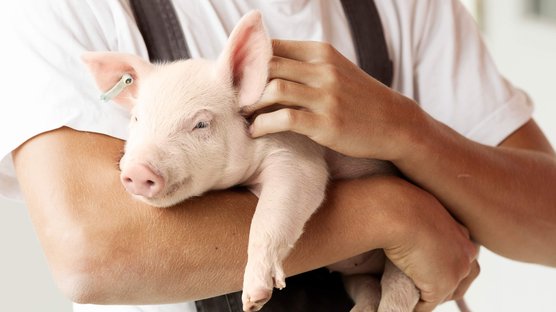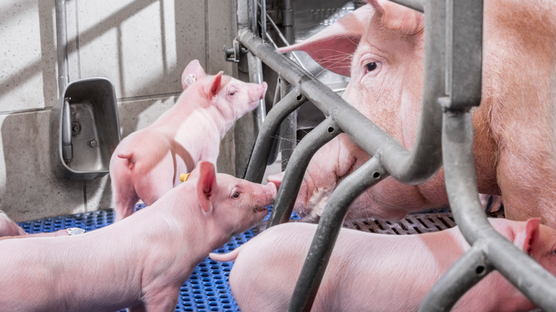
Published on July 28, 2025
Practical Tips to Maintain Swine Performance During Summer
Summer heat waves can pose significant challenges to swine production, reducing performance and impacting profitability. At Hendrix Genetics Swine, we use advanced genetics to ensure robust and productive animals. Associated with expert management strategies, we ensure productivity from farrow to finish during the hottest months of the year.
Hendrix Genetics Swine selects heat-resilient animals, leveraging nucleus facilities also in warm regions, to help swine producers minimize heat-related challenges. Discover how to avoid summertime drop in production through these different practical tips.
Climate Control and Ventilation
- Stabilize Temperatures: While every production system is unique, each also provides a set of environmental challenges. We must address them to achieve optimal performance. Always ensure a pleasant temperature and sufficient ventilation. Using different management systems for natural or mechanical swine ventilation systems can optimize the climate control for pigs. Proper ventilation is essential for maintaining comfort during summer heat.
- Optimize Airflow: Proper roof insulation helps retain cool air, allowing barns to function more like a 'refrigerator'. Appropriate systems include ducts, alleyway ventilation, or mechanical cooling for incoming air. Use the air inlet via the shadow side. You can equip air inlets with coolpads. Evaporating the water lowers the temperature of the incoming air by up to 6°C, which helps significantly improving pig comfort.
- Manage Humidity: The interaction between high humidity and high temperature will have a negative impact on pig performance. Sprinklers or misters can enhance the comfort zone of the animals in gestation barns but require close monitoring of humidity levels. High humidity can increase stress and reduce the efficacy of coolpads.
Monitoring the body temperature of pigs during heat events is essential. Even a slight increase in core temperature may indicate early signs of stress.
Feeding and Hydration Strategies
- Feed Timing: Schedule feedings during the cooler parts of the day (early morning and late evening) to encourage intake. During prolonged heat, pigs often eat less. Compensate by offering high-energy diets to maintain growth and performance. This helps maintain consistent productivity and heat stress.
- Ensure Optimal Hydration: Prevent dehydration. Access to clean and fresh water is critical. Analyze the quality of the water annually. Check if the dripping nipples release the required flow rate (liters / minute) to meet the following standards :
Piglets : 0.5 L/min
Growing pigs : 1.0 L/min
Gestating sows : 1.5 L/min
Lactating sows : 2.5 L/min
It's also important to recognize the signs of dehydration in pigs. Reacting quickly can help prevent performance losses and long-term health issues. Thus, knowing how much water do pigs drink at each stage can help maintain proper hydration levels, contributing to piglet survival rate and overall health.
Stress and Health Management
- Schedule Procedures Strategically: In the morning or late in the evening when barn temperatures are lower. This will help reduce the impact of heat stress in swine.
- Provide Spacious and Comfortable Pens: Avoid overcrowding. Ensure that pigs are able to rest during the hot hours of the day. Ample space and comfortable resting areas will reduce stress.
Managing summer heat is essential to maintaining swine welfare, performance and profitability. Swine producers can reduce heat stress and maintain productivity with our brand Hypor's heat-resistant genetics. Our practical tips will ensure optimal performance from farrow to finish.
By prioritizing climate control, proper hydration, and stress management, producers can not only overcome seasonal challenges. They can also take a significant step toward sustainable swine production. Adopting these practices strengthens long-term efficiency, addressing evolving industry demands and the challenges of global warming.
Any inquiries about how to keep pigs cool in hot weather ? Reach out to our Global Customer Services Specialist, Carlos Martins. He’ll make sure to get back to you within 48 working days hours to ensure you receive the best possible support.



